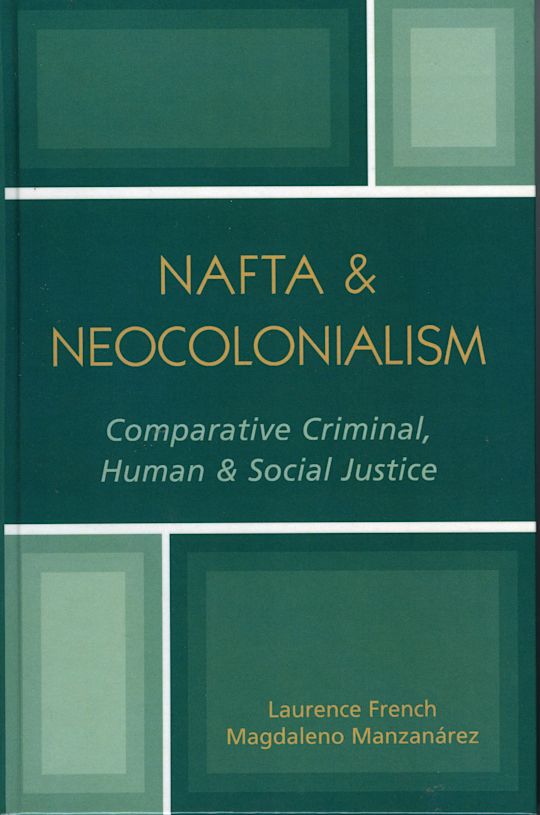- Home
- ACADEMIC
- Politics & International Relations
- Public Management, Administration and Policy
- NAFTA & Neocolonialism
NAFTA & Neocolonialism
Comparative Criminal, Human, & Social Justice
NAFTA & Neocolonialism
Comparative Criminal, Human, & Social Justice
This product is usually dispatched within 3 days
- Delivery and returns info
-
Free CA delivery on orders $40 or over
You must sign in to add this item to your wishlist. Please sign in or create an account
Description
This work is a study of the impacts of the North American Free Trade Agreement (NAFTA). By focusing on the issue of justice in the contexts of globalization and neo-colonialism, the book contributes to a broader discussion of the significance of NAFTA. Authors Laurence French and Magdaleno Manzanárez emphasize cultural and ethnic issues in the relations of NAFTA partners and enrich treatment of the topic by bringing to bear sociology, political science, justice studies, psychology, and educational theory. The authors relate classical sociological theory to contemporary issues of social and criminal justice.
Table of Contents
Chapter 2 The Roots of Neocolonialism
Chapter 3 The Annal's NAFTA Report
Chapter 4 Criminal, Human, and Social Justice Issues
Chapter 5 The Genesis of Neocolonialism: Mexico's Full Circle Journey; The Northern Border Colonial Wars
Chapter 6 World Economics & Social Justice: Worldviews and Perspectives on Social Justice; North American Socio-Economics and Social Justice
Chapter 7 Comparative Criminal & Human Justice: Comparative Criminal Justice in North America; Comparative Human Rights Issues
Chapter 8 Culture, Social Status, and Education: The Influence of Education on Social Status; Comparative Education in North America
Chapter 9 Endnotes
Chapter 10 Bibliography
Chapter 11 Index
Product details
| Published | Oct 22 2004 |
|---|---|
| Format | Paperback |
| Edition | 1st |
| Extent | 276 |
| ISBN | 9780761828907 |
| Imprint | University Press of America |
| Dimensions | 225 x 163 mm |
| Publisher | Bloomsbury Publishing |
About the contributors
Reviews
-
While much of the literature on NAFTA overlooks its social implications, French and Manzanárez examine NAFTA from the perspective of the long-excluded indigenous populations of the Americans, presenting a critical analysis of the treaty's negative impact on criminal, human, and social justice issues....Dealing with the rise and fall of the Mexican revolution, social and economic justice, and comparative educational systems, the book properly places the question of justice within the broader context of neocolonialism and globalization.... Summing Up: RECOMMENDED. Upper-division undergraduates through faculty.
M.E. Carranza, Texas A&M University?Kingsville, Choice Reviews
-
In the digital age, scholars wrestle with the evolving relationship of justice to the new globalism. French and Manzanárez's treatise is an important addition to the critical study of that relationship. The authors leap into the vortex where politics, culture, and economics collide. They emerge to suggest that classism, ethnocentrism, and inequality are still the driving forces of North American affairs. Agree or not, French and Manzanárez's treatise is provocative reading. Historically based and forcibly argued, it contributes mightily to our understanding of twenty-first century justice in the hemisphere we hold in common.
John T. Kirkpatrick, Associate Dean, University of New Hampshire and Director, Justiceworks



































